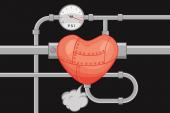HeartMate 3 Use Postapproval Is Soaring—and Equitably, New Numbers Show
Fewer Black patients underwent transplant by 1 year, but for those who got a heart, outcomes didn’t differ by gender or race.

Good news for the HeartMate 3 (Abbott Cardiovascular) as a bridge to heart transplantation: in the 2 years following US Food and Drug Administration approval of the left ventricular assist device (LVAD), its use has been climbing, with no signals of preferential use by race or gender.
Moreover, the new registry data show that while Black patients were less likely than white patients to undergo subsequent transplant within a year, there were no differences in posttransplant outcomes by race or by gender.
In the MOMENTUM 3 trial, the newest-generation, magnetically levitated LVAD slashed the rate of disabling stroke or reoperation and increased survival over 2 years in patients with advanced heart failure (HF) compared with its predecessor. The device was approved by the FDA as a bridge to transplant in 2017 and as destination therapy in 2018.
This new analysis, looking at some of the first longer-term outcomes in HeartMate 3 recipients, points to promising trends in terms of shrinking some of the disparities that exist among patients with HF and end-stage HF.
The HeartMate 3 is now the only commercially available LVAD, Mary N. Walsh, MD (Ascension St. Vincent Heart Center, Indianapolis, IN), who was not involved in the study, told TCTMD. As such, she said in an email, the results are “very reassuring” and should be shared with eligible patients considering an LVAD.
Racial Discrepancies
For the study, published online last week in JACC: Heart Failure, Steinberg and colleagues looked at all 11,524 patients listed for heart transplant between January 2018 and June 2020 in the Organ Procurement and Transplantation Network. Of the cohort, 955 (8.3%) received a HeartMate 3 device as a bridge to transplant; 16.6% were women and 31.7% were Black. The analysis excluded other racial/ethnic groups due to insufficient sample size.
Use of this LVAD rose for all patients over the study period from 28% to 63%, regardless of gender (P = 0.4) or race (P = 0.2). There were no gender differences observed in the rates of subsequent transplant (adjusted HR 0.92; 95% CI 0.70-1.21) or death/delisting (adjusted HR 0.91; 95% CI 0.59-1.42). However, Black patients were less likely to receive a heart transplant compared with white patients (adjusted HR 0.72; 95% CI 0.57-0.91), though the rates of death/delisting were similar (adjusted HR 1.36; 95% CI 0.98-1.89). Further, there were no interactions found by gender and race for either death/delisting or transplant.
At 1-year posttransplant, there were no differences seen in the rates of survival by gender (adjusted HR 0.52; 95% CI 0.21-1.70) or race (adjusted HR 0.76; 95% CI 0.34-1.70). There were also no differences in rates of stroke, acute rejection, or graft failure observed by race or gender within the study.
As for why Black patients may have waited longer for transplants than white patients, Walsh acknowledged that the “decision to accept organs and proceed to transplant is complex. Women have higher panel reactive antibody levels than men in general, and this limits the use of some donor hearts.” Women made up a larger percentage of Black patients, as compared with white patients, and “that might have influenced the time to transplant of the Black patients,” she added.
Commenting on the study for TCTMD, Jaime Moriguchi, MD (Cedars-Sinai Hospital, Los Angeles, CA), said his institution has not observed a similar discrepancy between Black and white patients, although he said he plans to look at their data more closely now.
“The basis on which patients get heart transplants is really on three things, at least in my simplistic way of looking at it,” he said, citing priority on the waiting list, body size, and blood type as the main considerations. “Race has nothing to do with whether they get a heart. We don't try to match Black with Black, Mexican with Mexican, and so forth. It's just whoever comes up.”
Moriguchi additionally noted that the heart failure etiology of white patients was most often ischemic (41.9%), while Black patients most often had dilated cardiomyopathies (80.9%). “You can explain that, of course, in that Blacks have more hypertension, but that shouldn't affect whether or not you get a heart,” he said.
Ultimately, the study results deserve further exploration, Moriguchi said. “I don't want to see any kind of discrepancy, because the system should be fair and equitable so that once you get a device, it should be based solely on your status,” he concluded.
Yael L. Maxwell is Senior Medical Journalist for TCTMD and Section Editor of TCTMD's Fellows Forum. She served as the inaugural…
Read Full BioSources
Steinberg RS, Okoh AK, Wang J, et al. Gender and race differences in HeartMate3 left ventricular assist device as a bridge to transplantation. JACC: Heart Failure. 2024;Epub ahead of print.
Disclosures
- Steinberg, Walsh, and Moriguchi report no relevant conflicts of interest.





Comments